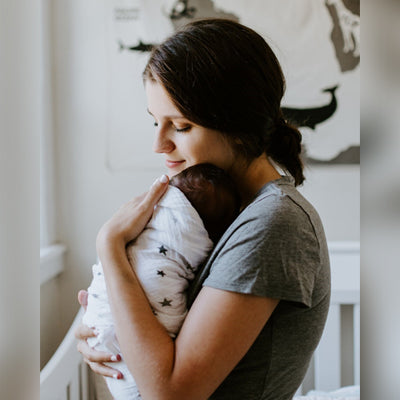
Why is My Baby Waking Up Early?
Share
If you have a baby who thinks 5 am is a good time to wake up and start the day, you are not alone. It can feel very challenging if your baby was sleeping through till 6:30 or 7 am, and then you start losing these precious hours of morning sleep. Some babies may never have got into a rhythm of sleeping through, which can be really exhausting. Understanding why your baby is waking early and putting a few strategies in place will make such a difference, making your morning much more manageable.
Here are some of the reasons why babies wake up early and a few tips to help everyone get a better night's sleep.
Why do babies wake up so early?
Sleep Cycles and Developmental Stages
A baby's sleep cycle is much shorter than an adult's, so their lighter stages of sleep happen more frequently. A baby will transition from light to deep sleep, making them more likely to wake up fully. If your baby is also going through a developmental transition, such as learning to roll over or sit up between 4 - 6 months, they will be more prone to waking up.
Environmental Factors
Babies are very sensitive to light and may stir if their room becomes too bright. They may also wake if there are noises outside or if the room they are sleeping in is too hot or too cold.
Hunger or Discomfort
As a baby's stomach is very small they may get hungry in the early hours of the morning. Also, if you are feeding your baby throughout the night, a wet nappy can cause discomfort and wake your little one.
Routine and Sleep Associations
If your baby frequently wakes through the night and is rocked back to sleep or fed, they may start creating a routine and keep waking up in the night at regular intervals. You may have noticed, for example, that your baby seems to wake for a feed at 1 am and 5 am every night and want to be fed, cuddled and rocked back to sleep.
Here are some strategies to help with early waking
Create a Sleep-Friendly Environment
Keep the room as dark as possible. This can be hard if your baby is still very little and needs night feeds and frequent changes, but a night light with a soft glow can help to give you enough light but won't wake your baby. Blackout blinds are brilliant and really help to keep the bright light of the mornings out of your room. A white noise machine can help to drown out external sounds and help soothe baby to sleep. Some sound machines respond to your baby's tiny cries and murmurs and can react with soothing sounds to help them drift back to sleep.
Adjust Baby's Bedtime
You may have been trying to keep your baby awake so they are tired and hopefully sleep for longer. This can, unfortunately, make your baby more likely to wake as they are overtired. Try adjusting your baby's bedtime by 15 minutes earlier over a few days and see how this makes a difference. For example, you may have been putting your baby to bed at 7:30 pm, but you may find that 6:30 pm suits your baby better.
Encourage Self-Soothing
Self-soothing is more applicable to older babies over the age of 6 months.
You can use techniques such as patting or gently shushing them so they learn to associate these methods with comfort. It can take a few weeks for your baby to adapt to these methods if they have been used to being rocked back to sleep. Eventually, you'll be able to give a few shushes, and they will self-settle. Once your baby no longer needs night feeds, they are even more likely to sleep through the night.
Early Feeding
If your baby likes to wake up around 5 am and has been woken up by hunger, try feeding them around 4:30 am. It may sound counterintuitive to wake up earlier, but with a full tummy, your baby may sleep until 7 am and give you a very necessary solid couple of hours.
Be Patient
Some babies take longer to find their own rhythm with sleep, but it will come if you're consistent with routine. Babies really do thrive with a bedtime routine. Monitor changes and expect developmental changes, colds and teething to affect how your baby sleeps. You may want to start your bedtime routine with a warm bath, then put them in their onesie and sleep bag, give them their night feed, and then give them a cuddle whilst gently patting their back and shushing. You can then continue this once they are in their cot. Some babies startle when you put them down, so putting them on their side before gently rolling them onto their back can help.
If you are starting a new sleep strategy, give it a couple of weeks to become routine. It can be disheartening when things don't change immediately, but your baby is learning, too. It's important to remember that this phase is just temporary, and your baby will sleep through eventually. With these gentle changes, you can encourage a later wake-up time for your baby, which means more sleep for everyone.
